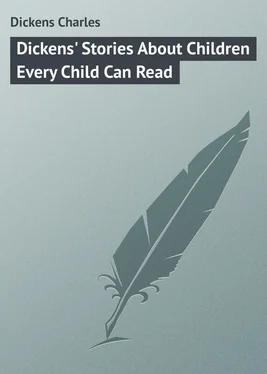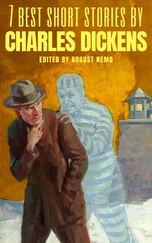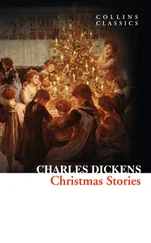Charles Dickens - Dickens' Stories About Children Every Child Can Read
Здесь есть возможность читать онлайн «Charles Dickens - Dickens' Stories About Children Every Child Can Read» — ознакомительный отрывок электронной книги совершенно бесплатно, а после прочтения отрывка купить полную версию. В некоторых случаях можно слушать аудио, скачать через торрент в формате fb2 и присутствует краткое содержание. Издательство: Иностранный паблик, Жанр: foreign_prose, на английском языке. Описание произведения, (предисловие) а так же отзывы посетителей доступны на портале библиотеки ЛибКат.
- Название:Dickens' Stories About Children Every Child Can Read
- Автор:
- Издательство:Иностранный паблик
- Жанр:
- Год:неизвестен
- ISBN:нет данных
- Рейтинг книги:4 / 5. Голосов: 1
-
Избранное:Добавить в избранное
- Отзывы:
-
Ваша оценка:
- 80
- 1
- 2
- 3
- 4
- 5
Dickens' Stories About Children Every Child Can Read: краткое содержание, описание и аннотация
Предлагаем к чтению аннотацию, описание, краткое содержание или предисловие (зависит от того, что написал сам автор книги «Dickens' Stories About Children Every Child Can Read»). Если вы не нашли необходимую информацию о книге — напишите в комментариях, мы постараемся отыскать её.
Dickens' Stories About Children Every Child Can Read — читать онлайн ознакомительный отрывок
Ниже представлен текст книги, разбитый по страницам. Система сохранения места последней прочитанной страницы, позволяет с удобством читать онлайн бесплатно книгу «Dickens' Stories About Children Every Child Can Read», без необходимости каждый раз заново искать на чём Вы остановились. Поставьте закладку, и сможете в любой момент перейти на страницу, на которой закончили чтение.
Интервал:
Закладка:
Dickens Charles
Dickens' Stories About Children Every Child Can Read
PREFACE
To the Young Reader:
Charles Dickens was one of the greatest among the many story-writers of "the Victorian age;" that is, the middle and latter part of the Nineteenth Century, when Victoria was Queen of Great Britain. Perhaps he was the greatest of them all for now, a generation after he passed away, more people read the stories of Dickens than those by any other author of that period. In those wonderful writings are found many pictures of child-life connected with the plan of the novels or stories. These child-stories have been taken out of their connections and are told by themselves in this volume. By and by you will read for yourselves, "The Christmas Carol," "The Chimes," "David Copperfield," "The Old Curiosity Shop," and the other great books by that fascinating writer, who saw people whom nobody else ever saw, and made them real. When you read those books you will meet again these charming children, and will remember them as the friends of your childhood.
Jesse L. Hurlbut.I.
TROTTY VECK AND HIS DAUGHTER MEG
"TROTTY" seems a strange name for an old man, but it was given to Toby Veck because of his always going at a trot to do his errands; for he was a ticket porter or messenger and his office was to take letters and messages for people who were in too great a hurry to send them by post, which in those days was neither so cheap nor so quick as it is now. He did not earn very much, and had to be out in all weathers and all day long. But Toby was of a cheerful disposition, and looked on the bright side of everything, and was grateful for any small mercies that came in his way; and so was happier than many people who never knew what it is to be hungry or in want of comforts. His greatest joy was his dear, bright, pretty daughter Meg, who loved him dearly.
One cold day, near the end of the year, Toby had been waiting a long time for a job, trotting up and down in his usual place before the church, and trying hard to keep himself warm, when the bells chimed twelve o'clock, which made Toby think of dinner.
"There's nothing," he remarked, carefully feeling his nose to make sure it was still there, "more regular in coming round than dinner-time, and nothing less regular in coming round than dinner. That's the great difference between 'em." He went on talking to himself, trotting up and down, and never noticing who was coming near to him.
"Why, father, father," said a pleasant voice, and Toby turned to find his daughter's sweet, bright eyes close to his.
"Why, pet," said he, kissing her and squeezing her blooming face between his hands, "what's to-do? I didn't expect you to-day, Meg."
"Neither did I expect to come, father," said Meg, nodding and smiling. "But here I am! And not alone, not alone!"
"Why you don't mean to say," observed Trotty, looking curiously at the covered basket she carried, "that you – "
"Smell it, father dear," said Meg. "Only smell it!"
Trotty was going to lift up the cover at once, in a great hurry, when she gaily interposed her hand.
"No, no, no," said Meg, with the glee of a child. "Lengthen it out a little. Let me just lift up the corner; just a lit-tle, ti-ny cor-ner, you know," said Meg, suiting the action to the word with the utmost gentleness, and speaking very softly, as if she were afraid of being overheard by something inside the basket. "There, now; what's that?"
Toby took the shortest possible sniff at the edge of the basket, and cried out in rapture:
"Why, it's hot," he said.
But to Meg's great delight he could not guess what it was that smelt so good.
"Polonies? Trotters? Liver? Pigs' feet? Sausages?" he tried one after the other. At last he exclaimed in triumph. "Why, what am I a-thinking of? It's tripe."
And it was.
"And so," said Meg, "I'll lay the cloth at once, father; for I have brought the tripe in a basin, and tied the basin up in a pocket-handkerchief; and if I like to be proud for once, and spread that for a cloth, and call it a cloth, there's nobody to prevent me, is there father?"
"Not that I know of, my dear," said Toby; "but they're always a-bringing up some new law or other."
"And according to what I was reading you in the paper the other day, father, what the judge said, you know, we poor people are supposed to know them all. Ha, ha! What a mistake! My goodness me, how clever they think us!"
"Yes, my dear," cried Trotty; "and they'd be very fond of any one of us that did know 'em all. He'd grow fat upon the work he'd get, that man, and be popular with the gentlefolks in his neighborhood. Very much so!"
"He'd eat his dinner with an appetite, whoever he was, if it smelt like this," said Meg cheerfully. "Make haste, for there's a hot potato besides, and half a pint of fresh-drawn beer in a bottle. Where will you dine, father – on the post or on the steps? Dear, dear, how grand we are! Two places to choose from!"
"The steps to-day, my pet," said Trotty. "Steps in dry weather, post in wet. There's greater conveniency in the steps at all times, because of the sitting down; but they're rheumatic in the damp."
"Then, here," said Meg, clapping her hands after a moment's bustle; "here it is all ready! And beautiful it looks! Come, father. Come!"
And just as Toby was about to sit down to his dinner on the door-steps of a big house close by, the chimes rang out again, and Toby took off his hat and said, "Amen."
"Amen to the bells, father?"
"They broke in like a grace, my dear," said Trotty; "they'd say a good one if they could, I'm sure. Many's the kind thing they say to me. How often have I heard them bells say, 'Toby Veck, keep a good heart, Toby!' A million times? More!"
"Well, I never!" cried Meg.
"When things is very bad, then it's 'Toby Veck, Toby Veck, job coming soon, Toby!'"
"And it comes – at last, father," said Meg, with a touch of sadness in her pleasant voice.
"Always," answered Toby. "Never fails."
While this discourse was holding, Trotty made no pause in his attack upon the savory meat before him, but cut and ate, and cut and drank, and cut and chewed, and dodged about from tripe to hot potato, and from hot potato back again to tripe, with an unfailing relish. But happening now to look all round the street – in case anybody should be beckoning from any door or window for a porter – his eyes, in coming back again, saw Meg sitting opposite him, with her arms folded, and only busy in watching his dinner with a smile of happiness.
"Why, Lord forgive me!" said Trotty, dropping his knife and fork. "My dove! Meg! why didn't you tell me what a beast I was?"
"Father!"
"Sitting here," said Trotty, in a sorrowful manner, "cramming, and stuffing, and gorging myself, and you before me there, never so much as breaking your precious fast, nor wanting to, when – "
"But I have broken it, father," interposed his daughter, laughing, "all to bits. I have had my dinner."
"Nonsense," said Trotty. "Two dinners in one day! It ain't possible! You might as well tell me that two New Year's days will come together, or that I have had a gold head all my life, and never changed it."
"I have had my dinner, father, for all that," said Meg, coming nearer to him. "And if you will go on with yours, I'll tell you how and where, and how your dinner came to be brought and – and something else besides."
Toby still appeared not to believe her; but she looked into his face with her clear eyes, and, laying her hand upon his shoulder, motioned him to go on while the meat was hot. So Trotty took up his knife and fork again and went to work, but much more slowly than before, and shaking his head, as if he were not at all pleased with himself.
Читать дальшеИнтервал:
Закладка:
Похожие книги на «Dickens' Stories About Children Every Child Can Read»
Представляем Вашему вниманию похожие книги на «Dickens' Stories About Children Every Child Can Read» списком для выбора. Мы отобрали схожую по названию и смыслу литературу в надежде предоставить читателям больше вариантов отыскать новые, интересные, ещё непрочитанные произведения.
Обсуждение, отзывы о книге «Dickens' Stories About Children Every Child Can Read» и просто собственные мнения читателей. Оставьте ваши комментарии, напишите, что Вы думаете о произведении, его смысле или главных героях. Укажите что конкретно понравилось, а что нет, и почему Вы так считаете.












